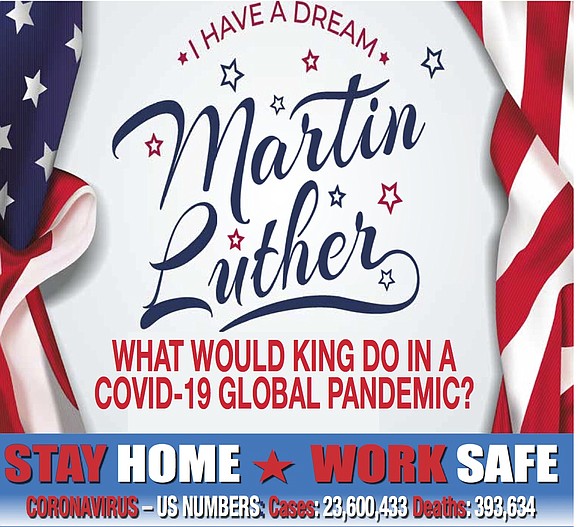What Would ‘King’ Do In A Global COVID-19 Pandemic?
Jo-Carolyn Goode | 1/15/2021, 4:01 a.m.
“The time is always right to do what is right,” said Dr. Martin Luther King, Jr. Throughout his life, King constantly sought out the wrong of injustice treatment of black and brown skin Americans to make it right with all of them being seen as equals under the law.
In 1966, King grew greatly concerned about the use of federal funds to support the discrimination of African American doctors and patients at Chicago hospitals. Afri- can Americans were receiving sub par treatment and doctors were being banned from being admitted to hospitals. King with the help of the Medical Committee for Human Rights blamed the American Medi- cal Association of “conspiracy of in- action” in civil rights. He wanted to “raise the conscience of the nation.”
“We are concerned about the constant use of federal funds to support this most notorious expres- sion of segregation. Of all the forms of inequality, injustice in health is the most shocking and the most inhuman because it often results in physical death,” said King at the 2nd annual Convention of the Medical Committee for Human Rights in March of 1966 in Chicago, IL.
Fifty-five years later we are still debating this same subject. An injustice in health with the handling of the COVID-19 pandemic has led to physical death of millions. Institutional racism still exists.
The low-income and disenfranchised have always had a hard time to survive day-in and day-out. COVID-19 made their lives even harder. Topping their mountain of bills for rent/mortgage, utilities, food, medicine, and other things, Families had to figure out how to home school with no computers and/or internet access, pay for PPEs, and remain healthy, sometimes with little to no income. Many had re- duced hours at work or lost their job completely. Then there are the questions. “Do I pay the water bill or the gas? Do I buy food and not prescriptions? Where will the money come from to keep up rent/mortgage payments? A lot of questions with no answers can stress anyone to their limit.
One of the biggest and most pressing issues for families is ade- quate healthcare. Underserved people usually lack proper healthcare due to many factors. Some include not being able to afford the insurance, not having a primary doctor, not having access to quality doctors, and so on. Lack of proper healthcare makes this segment of the community even more susceptible to illnesses and diseases like the coronavirus. When families do decide to get medical attention, most head to the hospital ER instead of a doctor’s office and sometimes they wait to long to get help. Something must be done to allow this community to have ade- quate healthcare.
This kind of fight is what King lived to do. He had a pas- sion for elevating the quality of life for Black Americans to be treat like American citizens just like their white counterparts. In his eyes, everyone should be treated equally under the law. It’s only fair, right? Right, it is.
If King Were Alive Today How Would He Handle The Global Pandemic?
From his past work, we all know that King preached nonvi- olence. Before he took any action King would get a clear understand- ing of the problem to better develop his plan. He was known for taking a large problem and breaking it down into smaller objectives to do local grassroots campaigns. The next step was to find a suitable face for the campaign. For instance, when King was over the Montgomery Bus Boycotts the face of the movement was Rosa Parks. Although Parks was not the first person to not give up her seat to a white person but, she was thought to be a better fit for the campaign versus Claudette Colvin, who was the first to do so. With all those moving pieces in motion, King could start to mold his effective response to the wrongdoing. A greater impact would be felt with the more people involved. This is why King often partnered with organizations with the same thrust as he. In the mist of the campaign, King would check off goals accomplished. Any grievances he had he made them known all the way up to the nation’s capitol. The last step with any plan is to eval- uate your goals achieved, lessons learned, and future objectives.
Here is my big disclaimer: The writer wrote how she believes King would act in a global pandemic where equal treatment was not given to all. By no means is any of this factual – this is just the writer’s belief based off previous actions by King in the fight for civil rights.





